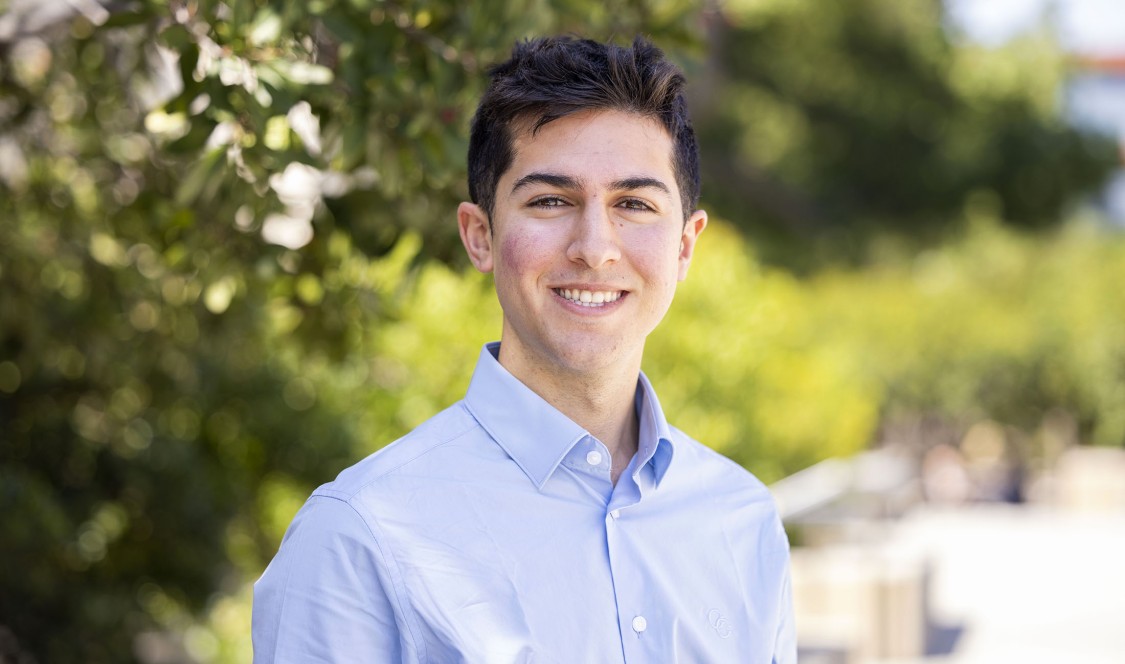Armin Hamrah ’27, a Claremont McKenna College sophomore dual majoring in Science Management and Cognitive Science, has been awarded the Barry Goldwater Scholarship, the highest governmental honor for undergraduate students pursuing degrees in science, technology, engineering, or math (STEM).
Granted to college sophomores and juniors who aspire to become the next generation of research leaders, the Goldwater Scholarship is among the oldest and most sought-after undergraduate scholarships in the STEM fields. Twelve Claremont McKenna students have been named Goldwater Scholars since Congress established the scholarship in 1986 to honor U.S. Senator Barry Goldwater.
“Whether the path is technology, strategy, or community, Armin has a unique ability to seek out—and find—a personal place within each challenge. In everything he pursues, Armin advances both results and the relationships involved,” said Zachary Dodds, the Leonhard-Johnson-Rae Chair of Computer Science at Harvey Mudd College—a member of The Claremont Colleges that shares courses with Claremont McKenna—and one of Hamrah’s mentors.
Hamrah is one of 441 Goldwater Scholars selected from a pool of 5,000 undergraduate students nominated by 445 academic institutions in the United States, according to the Barry Goldwater Scholarship & Excellence in Education Foundation. The scholarship provides $7,500 per academic year, as well as mentorship within the Goldwater cohort.
For his research work, Hamrah is investigating both the scientific underpinnings of lucid dreaming and advancing our understanding of frontier AI model performance. He hopes that these two—currently somewhat siloed fields of study—will be able to unionize in the coming years, hypothesizing that “new computational methods will likely be the breakthrough that enables more lucid dreaming and hypnopedia (sleep learning).”
“I’m having a blast researching these topics, running statistical analyses, and collaborating with leading researchers,” said Hamrah, who grew up in Redwood City, Calif. “The idea that we can transform eight hours of unconsciousness into boundless exploration electrifies me… Many advances in lab induction and reality check techniques have followed, but they are unreliable, lackluster, and only lead to brief dreams averaging under two minutes.”
Hamrah’s mission is to develop reliable methods to induce lucid dreams in the lab. He plans to pursue a Ph.D. in Computational Neuroscience and hopes to bring cutting-edge machine-learning methods to neuroscience by researching dreams and building sleep technology. “Lucid dreams are incredibly rare, and despite promising pilot results, rigorous scientific studies on the impacts of lucid dreams are scarce,” he said.
Remington Mallett, a postdoctoral researcher at Northwestern University and mentor to Hamrah, has worked with him on lucid dream research. “Armin has carved himself out as a unique character, even among elite students. In our first year of working closely together, Armin proved himself to be an inspired and promising young scientist,” said Mallett.
Hamrah represents the College’s mission to prepare students for thoughtful and productive lives and responsible leadership in business, government, and the professions, and to pursue scholarship that contributes to intellectual vitality and the understanding of public policy issues, said Yi Shun Lai ’96, CMC’s Interim Assistant Director of Fellowships Advising.
“Armin’s professors call out his dedication to forwarding the field of lucid dreaming,” said Lai. “Specifically, they note his dedication to understanding whether or not a lucid dream state can be induced. It’s clear they believe his contributions to this field will be significant. With the backing of the Goldwater and the clout this particular award carries, I’m sure he’ll make a mark on this area of work.”

